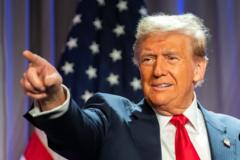Trump's comments reflect a broader aggressive trade policy he promoted throughout his campaign, aiming to reinforce the US dollar's position in global economics while engaging in leverage tactics with other nations. Despite internal discussions among BRICS members about creating their own currency to lessen reliance on the US dollar, progress has been hindered by disagreements. Politicians in Brazil and Russia have shown interest in this initiative, but Trump’s ultimatum could signal a tough road ahead for these discussions.
His rhetoric aligns with his previously pronounced agenda of utilizing tariffs as a tool for negotiation and economic fortification. During the electoral campaign, Trump outlined the intent to impose widespread tariffs on various countries, a policy strategy that some analysts believe serves as a form of negotiation leverage rather than an absolute commitment to immediate action.
Republican Senator Ted Cruz affirmed the use of tariffs as leverage, citing their effectiveness in prompting responses from other countries, while Trump's Treasury Secretary nominee, Scott Bessent, described this strategy as "escalate to de-escalate." This complex economic stance underscores a longstanding belief within the Trump camp that tariffs serve to protect American jobs and interests, though economists largely contest the effectiveness of this approach, arguing that consumers ultimately foot the bill.
As tensions rise among global economic players, the implications of Trump's threat loom large, potentially exacerbating trade relations with BRICS member nations already weighing the merits of dollar independence.
While Trump's administration prepares to take office on January 20, 2024, the world watches closely to see whether these threats will lead to significant economic shifts or remain mere bargaining chips in ongoing international negotiations.
His rhetoric aligns with his previously pronounced agenda of utilizing tariffs as a tool for negotiation and economic fortification. During the electoral campaign, Trump outlined the intent to impose widespread tariffs on various countries, a policy strategy that some analysts believe serves as a form of negotiation leverage rather than an absolute commitment to immediate action.
Republican Senator Ted Cruz affirmed the use of tariffs as leverage, citing their effectiveness in prompting responses from other countries, while Trump's Treasury Secretary nominee, Scott Bessent, described this strategy as "escalate to de-escalate." This complex economic stance underscores a longstanding belief within the Trump camp that tariffs serve to protect American jobs and interests, though economists largely contest the effectiveness of this approach, arguing that consumers ultimately foot the bill.
As tensions rise among global economic players, the implications of Trump's threat loom large, potentially exacerbating trade relations with BRICS member nations already weighing the merits of dollar independence.
While Trump's administration prepares to take office on January 20, 2024, the world watches closely to see whether these threats will lead to significant economic shifts or remain mere bargaining chips in ongoing international negotiations.





















